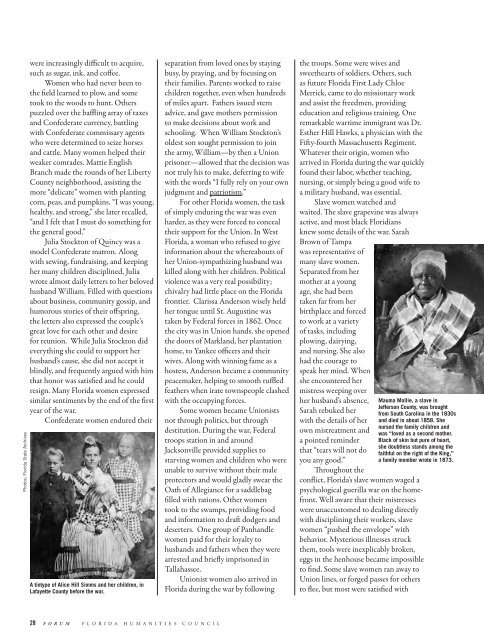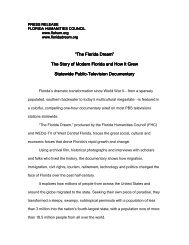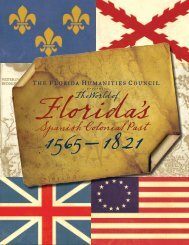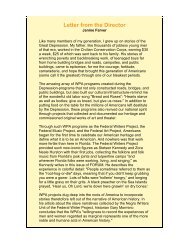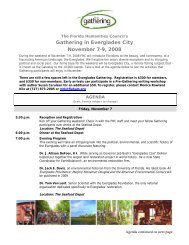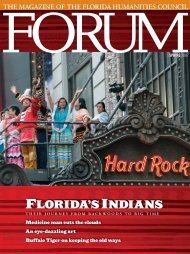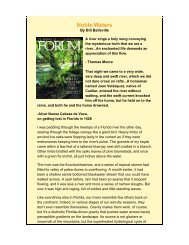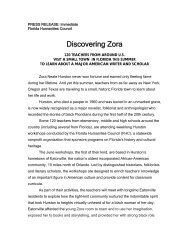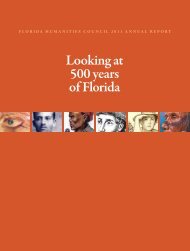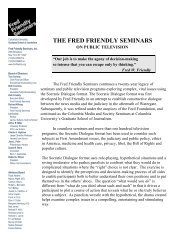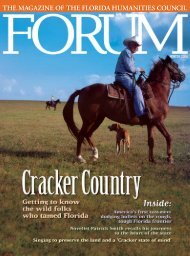when florida “Opened up the gates of hell” - Florida Humanities ...
when florida “Opened up the gates of hell” - Florida Humanities ...
when florida “Opened up the gates of hell” - Florida Humanities ...
Create successful ePaper yourself
Turn your PDF publications into a flip-book with our unique Google optimized e-Paper software.
Photos: <strong>Florida</strong> State Archives<br />
were increasingly difficult to acquire,<br />
such as sugar, ink, and c<strong>of</strong>fee.<br />
Women who had never been to<br />
<strong>the</strong> field learned to plow, and some<br />
took to <strong>the</strong> woods to hunt. O<strong>the</strong>rs<br />
puzzled over <strong>the</strong> baffling array <strong>of</strong> taxes<br />
and Confederate currency, battling<br />
with Confederate commissary agents<br />
who were determined to seize horses<br />
and cattle. Many women helped <strong>the</strong>ir<br />
weaker comrades. Mattie English<br />
Branch made <strong>the</strong> rounds <strong>of</strong> her Liberty<br />
County neighborhood, assisting <strong>the</strong><br />
more “delicate” women with planting<br />
corn, peas, and pumpkins. “I was young,<br />
healthy, and strong,” she later recalled,<br />
“and I felt that I must do something for<br />
<strong>the</strong> general good.”<br />
Julia Stockton <strong>of</strong> Quincy was a<br />
model Confederate matron. Along<br />
with sewing, fundraising, and keeping<br />
her many children disciplined, Julia<br />
wrote almost daily letters to her beloved<br />
husband William. Filled with questions<br />
about business, community gossip, and<br />
humorous stories <strong>of</strong> <strong>the</strong>ir <strong>of</strong>fspring,<br />
<strong>the</strong> letters also expressed <strong>the</strong> co<strong>up</strong>le’s<br />
great love for each o<strong>the</strong>r and desire<br />
for reunion. While Julia Stockton did<br />
everything she could to s<strong>up</strong>port her<br />
husband’s cause, she did not accept it<br />
blindly, and frequently argued with him<br />
that honor was satisfied and he could<br />
resign. Many <strong>Florida</strong> women expressed<br />
similar sentiments by <strong>the</strong> end <strong>of</strong> <strong>the</strong> first<br />
year <strong>of</strong> <strong>the</strong> war.<br />
Confederate women endured <strong>the</strong>ir<br />
A tintype <strong>of</strong> Alice Hill Simms and her children, in<br />
Lafayette County before <strong>the</strong> war.<br />
28 F O R U M F L O R I D A H U M A N I T I E S C O U N C I L<br />
separation from loved ones by staying<br />
busy, by praying, and by focusing on<br />
<strong>the</strong>ir families. Parents worked to raise<br />
children toge<strong>the</strong>r, even <strong>when</strong> hundreds<br />
<strong>of</strong> miles apart. Fa<strong>the</strong>rs issued stern<br />
advice, and gave mo<strong>the</strong>rs permission<br />
to make decisions about work and<br />
schooling. When William Stockton’s<br />
oldest son sought permission to join<br />
<strong>the</strong> army, William—by <strong>the</strong>n a Union<br />
prisoner—allowed that <strong>the</strong> decision was<br />
not truly his to make, deferring to wife<br />
with <strong>the</strong> words “I fully rely on your own<br />
judgment and patriotism.”<br />
For o<strong>the</strong>r <strong>Florida</strong> women, <strong>the</strong> task<br />
<strong>of</strong> simply enduring <strong>the</strong> war was even<br />
harder, as <strong>the</strong>y were forced to conceal<br />
<strong>the</strong>ir s<strong>up</strong>port for <strong>the</strong> Union. In West<br />
<strong>Florida</strong>, a woman who refused to give<br />
information about <strong>the</strong> whereabouts <strong>of</strong><br />
her Union-sympathizing husband was<br />
killed along with her children. Political<br />
violence was a very real possibility;<br />
chivalry had little place on <strong>the</strong> <strong>Florida</strong><br />
frontier. Clarissa Anderson wisely held<br />
her tongue until St. Augustine was<br />
taken by Federal forces in 1862. Once<br />
<strong>the</strong> city was in Union hands, she opened<br />
<strong>the</strong> doors <strong>of</strong> Markland, her plantation<br />
home, to Yankee <strong>of</strong>ficers and <strong>the</strong>ir<br />
wives. Along with winning fame as a<br />
hostess, Anderson became a community<br />
peacemaker, helping to smooth ruffled<br />
fea<strong>the</strong>rs <strong>when</strong> irate townspeople clashed<br />
with <strong>the</strong> occ<strong>up</strong>ying forces.<br />
Some women became Unionists<br />
not through politics, but through<br />
destitution. During <strong>the</strong> war, Federal<br />
troops station in and around<br />
Jacksonville provided s<strong>up</strong>plies to<br />
starving women and children who were<br />
unable to survive without <strong>the</strong>ir male<br />
protectors and would gladly swear <strong>the</strong><br />
Oath <strong>of</strong> Allegiance for a saddlebag<br />
filled with rations. O<strong>the</strong>r women<br />
took to <strong>the</strong> swamps, providing food<br />
and information to draft dodgers and<br />
deserters. One gro<strong>up</strong> <strong>of</strong> Panhandle<br />
women paid for <strong>the</strong>ir loyalty to<br />
husbands and fa<strong>the</strong>rs <strong>when</strong> <strong>the</strong>y were<br />
arrested and briefly imprisoned in<br />
Tallahassee.<br />
Unionist women also arrived in<br />
<strong>Florida</strong> during <strong>the</strong> war by following<br />
<strong>the</strong> troops. Some were wives and<br />
swee<strong>the</strong>arts <strong>of</strong> soldiers. O<strong>the</strong>rs, such<br />
as future <strong>Florida</strong> First Lady Chloe<br />
Merrick, came to do missionary work<br />
and assist <strong>the</strong> freedmen, providing<br />
education and religious training. One<br />
remarkable wartime immigrant was Dr.<br />
Es<strong>the</strong>r Hill Hawks, a physician with <strong>the</strong><br />
Fifty-fourth Massachusetts Regiment.<br />
Whatever <strong>the</strong>ir origin, women who<br />
arrived in <strong>Florida</strong> during <strong>the</strong> war quickly<br />
found <strong>the</strong>ir labor, whe<strong>the</strong>r teaching,<br />
nursing, or simply being a good wife to<br />
a military husband, was essential.<br />
Slave women watched and<br />
waited. The slave grapevine was always<br />
active, and most black Floridians<br />
knew some details <strong>of</strong> <strong>the</strong> war. Sarah<br />
Brown <strong>of</strong> Tampa<br />
was representative <strong>of</strong><br />
many slave women.<br />
Separated from her<br />
mo<strong>the</strong>r at a young<br />
age, she had been<br />
taken far from her<br />
birthplace and forced<br />
to work at a variety<br />
<strong>of</strong> tasks, including<br />
plowing, dairying,<br />
and nursing. She also<br />
had <strong>the</strong> courage to<br />
speak her mind. When<br />
she encountered her<br />
mistress weeping over<br />
her husband’s absence,<br />
Sarah rebuked her<br />
with <strong>the</strong> details <strong>of</strong> her<br />
own mistreatment and<br />
a pointed reminder<br />
that “tears will not do<br />
you any good.”<br />
Throughout <strong>the</strong><br />
conflict, <strong>Florida</strong>’s slave women waged a<br />
psychological guerilla war on <strong>the</strong> homefront.<br />
Well aware that <strong>the</strong>ir mistresses<br />
were unaccustomed to dealing directly<br />
with disciplining <strong>the</strong>ir workers, slave<br />
women “pushed <strong>the</strong> envelope” with<br />
behavior. Mysterious illnesses struck<br />
<strong>the</strong>m, tools were inexplicably broken,<br />
eggs in <strong>the</strong> henhouse became impossible<br />
to find. Some slave women ran away to<br />
Union lines, or forged passes for o<strong>the</strong>rs<br />
to flee, but most were satisfied with<br />
Mauma Mollie, a slave in<br />
Jefferson County, was brought<br />
from South Carolina in <strong>the</strong> 1830s<br />
and died in about 1858. She<br />
nursed <strong>the</strong> family children and<br />
was “loved as a second mo<strong>the</strong>r.<br />
Black <strong>of</strong> skin but pure <strong>of</strong> heart,<br />
she doubtless stands among <strong>the</strong><br />
faithful on <strong>the</strong> right <strong>of</strong> <strong>the</strong> King,”<br />
a family member wrote in 1873.


